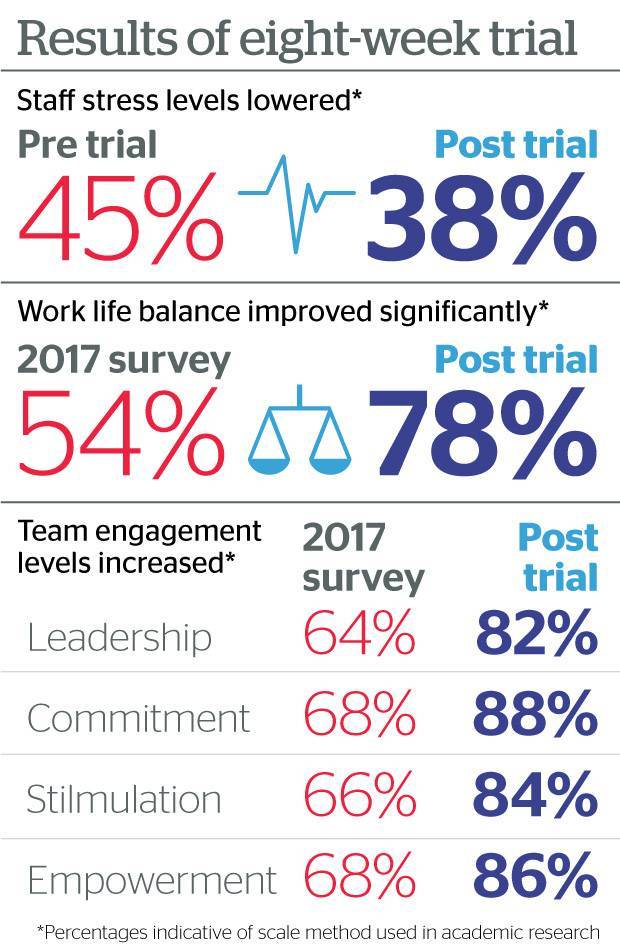Background: 4-day work week - a real opportunity or a fantasy?

Not so long ago, articles about the experiment with the duration of the working week conducted by Perpetual Guardian in New Zealand began to appear online. It ended ahead of schedule, just two months after the start, showing excellent results, according to company management. They were so good that Andrew Barnes, the CEO of Perpetual Guardian, decided to introduce a four-day work week on an ongoing basis.
According to him, it all started with a desire to test the theory that a decrease in the number of working days in a week will positively affect the performance of employees and the overall productivity of the company. How innovative can this experiment be considered, and what does the shortened work week really look like? We understand in today's "Help".
What is known about the Perpetual Guardian experiment?
Most news and articles state that the company’s management provided an extra day off to its employees, which is fully paid, just like the other two.
')
As it turned out, the stress level of employees after a decrease in the number of working days decreased from 45 to 38%, and the motivation to work, on the contrary, increased from 54 to 78%. The performance gain in terms of one hour of working time was about 20%.

In the opinion of the company's management, labor productivity and employee satisfaction have increased because people have had the opportunity to devote more time to their favorite business — more often with friends and relatives, and more time to give hobbies.
Does everything really work the way the Perpetual Guardian executive says?
This may well be true. Research on a shorter working week has been conducted for a long time; the experiment by New Zealanders is by no means new .
Scientific studies are being conducted that show that the more a person spends time at work (and not only spends, but works), the worse he feels. Life satisfaction decreases, mood deteriorates, concentration and enthusiasm decrease, as a result, labor productivity drops. Moreover, spending a lot of time at work means increasing the likelihood of a stroke , type 2 diabetes, or a heart attack. And this is if you forget about unpleasant "little things" like chronic fatigue, depression, increased anxiety, etc.

Social conditions are also deteriorating, because the more we work, the less time is left for friends and relatives. The workaholic loses friends, decreases the location of relatives and friends. In addition, to work more does not mean to do more, that is, the performance of a “marathoner” is lower than the performance of an employee who works in due time or even less.
Where's the catch?
In fact, when we are told about a four-day working week, this does not mean that there are less working hours this week than usual. In some cases, this is true, but more often, the company's management simply increases the number of hours in the workday from 8 to 10. And this adds one day off. It is unclear how exactly Perpetual Guardian did, but most likely the number of working hours per week remained the same.
In addition, news stories and articles that talk about a shorter work week usually do not mention the increasing complexity of workflow management over time. The fact is that it is impossible to allow absolutely all employees to be absent from the workplace on Friday, since the company's partners / customers still work on that day. Therefore, employees are given a choice - to rest on Friday or on Monday, and the management tries to balance the number of those and others.
What other experiments were conducted with the modification of the working week?

In Japan, for example, the government introduced measures against extra working hours spent by employees of various companies in the country in their offices. Officials suggested “shining Mondays,” as the rule is called, according to which employees can come to work much later than usual on one Monday of the working month. In addition, the Japanese had the opportunity to leave work on Friday at 3 pm. This measure is called “bonus Fridays”.
Treehouse from the United States also conducted an experiment with a four-day working week, which ended in a return to the normal week.
In Sweden, the company Svartedalen, also conducted a corresponding experiment, lasting for two years, but it was also canceled, returning everything to normal. As it turned out, in order to allow its employees to rest 3 days a week, the company had to hire additional staff who were doing the work at the time when the “core team” was resting. In the course of this experiment, at first everything was fine, difficulties were discovered much later.
And if you work 2-3 days a week?
The idea of reducing the work week to four days is quite robust. Above it was said that scientists showed an increase in the productivity of employees who were transferred to a 4-day week. At the same time, a further reduction does not make sense, another team of scientists led by Professor De Neve of Oxford showed that the optimum is just 4 working days a week, if you reduce the number of days and beyond, it will not bring results.
However, this reduction is not applicable to every line of business. For example, industry - who will give the rate of production at a metallurgical plant, if you shorten the working week? And if a worker gives a norm, that is, he produces a certain amount of products per day, he will in most cases not be able to significantly exceed this norm, even if he spends an extra day a week. Here you can remember Ilona Mask and his company Tesla Inc, where everything is aimed at increasing the production rate of electric vehicles. A four-day work week is out of the question here.
By the way, the company Perpetual Guardian is engaged in jurisprudence and can afford some liberties with the work week. Yes, and the experiment was carried out only for two months, while the same Dutch worked in the same mode for two years, after which they realized that this could not continue.

The success of Perpetual Guardian is rare, it can hardly be scaled to other companies, even if they are of a legal nature, but larger ones. And even more so it is impossible to try on the results of this experiment to companies from other areas - the course of the experiment will be quite different.
The general conclusion is that shorter weeks are good, but for the time being almost not applicable to the current working conditions of most companies. In addition, much more similar experiments (and long-term ones) are needed to say with certainty - yes, this brings results.
Source: https://habr.com/ru/post/421891/
All Articles